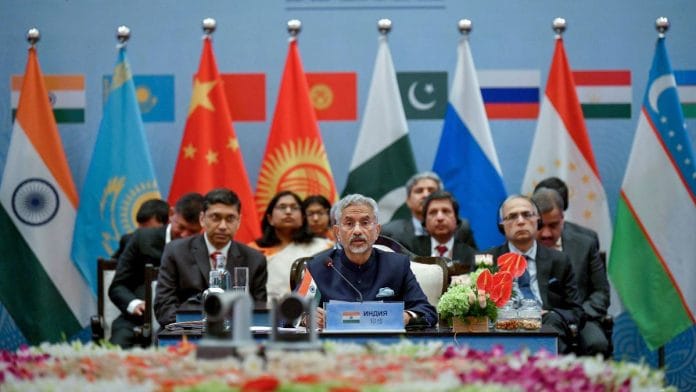Prime Minister Narendra Modi did not attend the 24th Shanghai Cooperation Organisation summit in Astana, Kazakhstan, last week. Instead, the External Affairs Minister S Jaishankar headed the Indian delegation and read the PM’s remarks at the Astana summit.
During the discussions, the EAM emphasised New Delhi’s long-term priorities at SCO, highlighting terrorism, robust connectivity, respecting the sovereignty and territorial integrity, and recognising the critical importance of Central Asia to the forum. He criticised the China-Pakistan Economic Corridor for violating India’s sovereignty in Pakistan-occupied Kashmir.
New Delhi seeks to reconfigure the SCO platform into a development-focused entity rather than one with an anti-Western agenda. And that was reflected in the Indian intervention.
Reassessing India’s SCO engagement
The SCO was founded in 2001 to catalyse collaborative efforts on regional, geopolitical, and geostrategic challenges. In 2005, India, Pakistan, and Iran were granted observer status. New India and Islamabad became full members in 2017.
From the beginning, the SCO prioritised combatting terrorism, separatism, and extremism as outlined in Article 1 of its charter. India’s main focus at the SCO was to eradicate terrorism and terrorist groups from its northwest border while also promoting connectivity and socio-economic development in Eurasia. However, despite the SCO’s vision, some member countries used terrorism as a foreign policy tool to propel terrorism in Eurasia and against India.
Consequently, shifting geopolitical interests within the grouping have made the SCO ineffective in addressing state-sponsored terrorism. New Delhi has always advocated greater convergence on counterterrorism and has successfully raised the issue of state-sponsored terrorism, albeit with limited success against Pakistan-based terror groups. Similarly, the divergent stances on a peaceful, prosperous, and stable Afghanistan highlight the failure of this Eurasian grouping, as member countries prioritise their parochial interests over a shared vision for a peaceful Eurasia.
Also read: Kargil War 25th anniversary is the time to finish an incomplete task–overhaul defence ministry
Cooperation, competition, connectivity
New Delhi revamped its Eurasia strategy after the collapse of the Soviet Union to broaden its geostrategic interests in the hydrocarbon-rich area. However, under Chinese influence, Pakistan blocked India’s efforts to initiate regional connectivity and infrastructure projects throughout its territory. In contrast, the construction of the CPEC—a flagship programme of China’s Belt and Road Initiative (BRI), which aims to build infrastructure projects within Pakistan with Chinese investments of more than $62 billion—violates India’s sovereignty and integrity in PoK.
India has pushed for robust connectivity between South and Central Asia since 2005 while respecting other nations under the SCO’s “Shanghai Spirit”. In this regard, India strategically utilised the SCO forum to improve relations with Central Asian Republics (CARs), countering Chinese dominance in regional connectivity projects. India has heavily invested in Chabahar Port, the International North-South Transport Corridor (INSTC), and it has become part of the Ashgabat agreement. India-led projects are transparent, consultative, economical, and reliable.
Barring China and Pakistan, all SCO member countries, especially CARs, have sought greater cooperation on connectivity projects through bilateral and multilateral agreements. The Chabahar trilateral grouping between Uzbekistan, India and Iran, seeks to link the eastern route of INSTC with Chabahar to enhance Eurasian connectivity. The Eastern Route, also known as the 928-km Kazakhstan-Turkmenistan-Iran (KTI) line, runs east of the Caspian Sea. Once connected to Chabahar via the 628-km Chabahar-Zahedan railway line, it will boost India-Eurasia trade. During the inaugural India-Central Asia summit in 2022, the CARs endorsed and proposed the inclusion of the Chabahar port in the INSTC to facilitate increased trade.
Due to the fragile global political environment and the ongoing Russia-Ukraine conflict, China has tried to assert dominance over the SCO. It aims to transform the grouping into a China-led multilateral forum for regional geoeconomic and strategic interests, particularly to help BRI gain regional prominence.
BRI is Beijing’s strategic tool to offer large funds for mega infrastructure and connectivity projects, only to gain greater control of the assets in the recipient countries if they default on loan repayment. Beijing has used the project to pursue its hegemonic interests rather than providing any gains to the CARs. However, despite China’s inroads, CARs remain one of the world’s least connected economies, giving India a chance to strengthen its presence.
In 2020, New Delhi provided a $1 billion credit line for regional connectivity and started connectivity projects like Tajikistan’s Dushanbe-Chortut highway.
Indian prime minister’s non-attendance at the SCO summit is unlikely to have any long-term ramifications. The EAM’s reiteration of India’s stand on the SCO’s core principles underlines the country’s commitment to the region and forum.
The actions of a few SCO member states have forced India to reconsider its broader economic and strategic priorities, primarily because these states have worked against New Delhi’s core concerns in the region. The deep-seated contradictions among member states on regional security and terrorism, combined with growing Chinese influence, have compelled New Delhi to perform a strategic balancing act. India is cementing its bilateral ties with regional key economies without downgrading its engagement with the SCO. Modi’s visit to Russia this week will send this message loud and clear.
Harsh V. Pant is Vice President of Studies and Foreign Policy at the Observer Research Foundation (ORF) in New Delhi. Ayjaz Wani is a Fellow in the Strategic Studies Programme at ORF. Views are personal.
(Edited by Ratan Priya)






